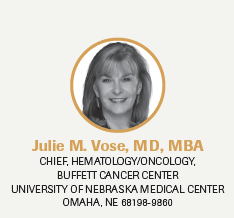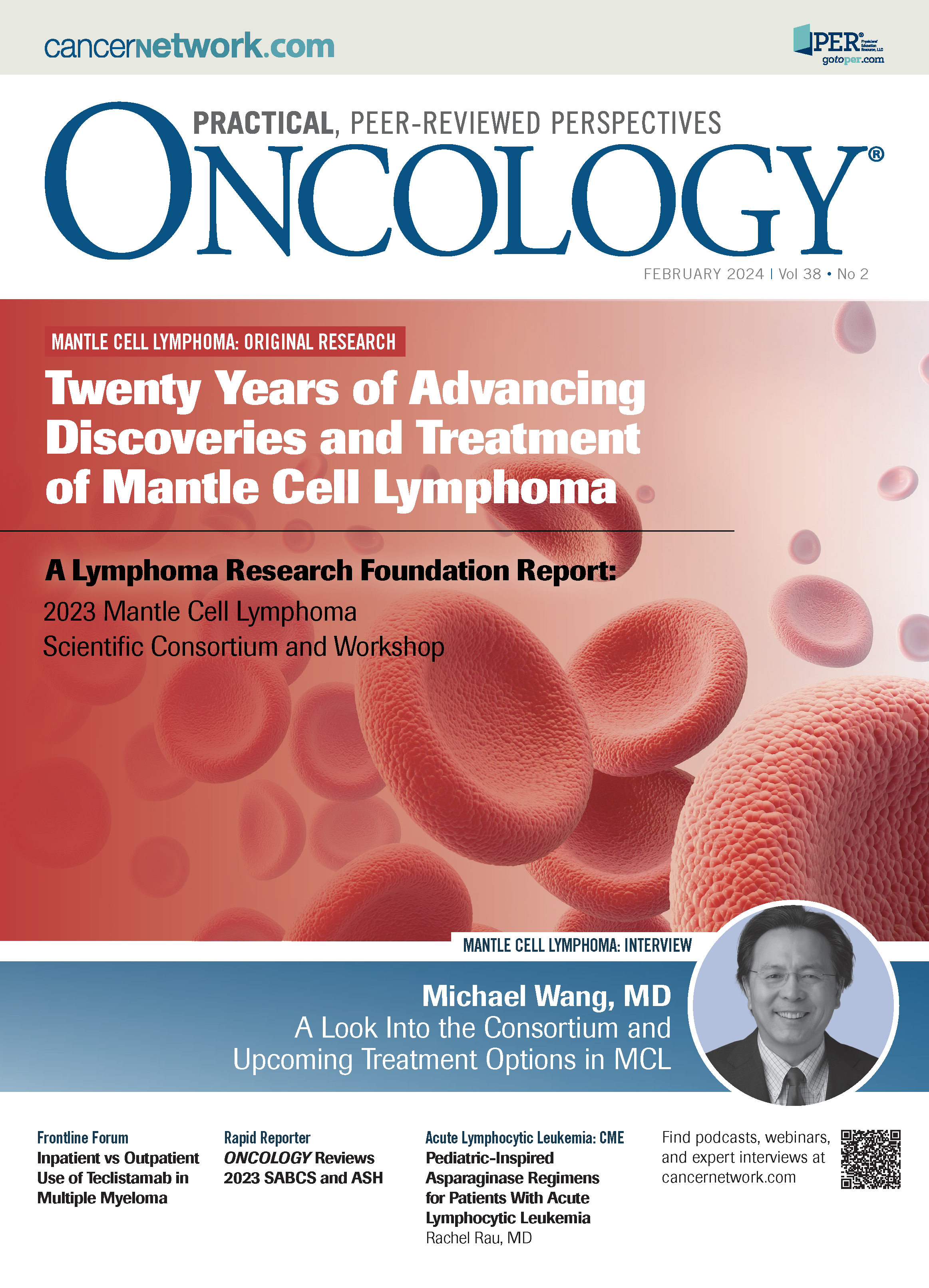Key Takeaways From ASH 2023: Emerging Trends in Hematologic Oncology
Julie M. Vose, MD, MBA, gave a brief overview of the 2023 American Society of Hematology Annual Meeting & Exposition, as well as what to be on the lookout for in 2024.
Julie M. Vose, MD, MBA, gave a brief overview of the 2023 American Society of Hematology Annual Meeting & Exposition, as well as what to be on the lookout for in 2024.

There have been several breakthroughs in nonmalignant hematology care recently, including the 2023 FDA approvals of Casgevy and Lyfgenia for the treatment of patients with sickle cell disease.1 During the 65th American Society of Hematology (ASH) Annual Meeting and Exposition, results from the phase 2/3 CLIMB SCD-121 trial (NCT03745287) using exagamglogene autotemcel (exa-cel) were presented, demonstrating the utility of editing ex vivo with CRISPR-Cas9 technology of the erythroid-specific enhancer region of BCL11A.2 This resulted in increased hemoglobin F production, with 96.7% of patients with severe sickle cell disease being free from vaso-occlusive events and 100% being free from hospitalization.
Additional studies were presented for patients with severe β-thalassemia who received exa-cel; more than 90% of patients achieved transfusion independence, with an improvement in quality of life.3 Another potentially major accomplishment for patients with severe hemophilia A or B was presented with the treatment of marstacimab, a novel monoclonal antibody that neutralizes tissue factor pathway inhibitor.4 This antibody then increases thrombin through the extrinsic pathway. Taken together, these therapies represent major advancements in the treatment of these nonmalignant hematologic disorders.
Several updates on outcomes of clinical trials and real-world experiences for hematologic malignancies were also presented at ASH. A late-breaking abstract of the phase 3 SYMPATICO study (NCT03112174) of ibrutinib (Imbruvica) plus venetoclax (Venclexta) vs ibrutinib plus placebo for patients with relapsed mantle cell lymphoma was presented. The results demonstrated a statistically significant improvement in progression-free survival (PFS) for the combination of ibrutinib plus venetoclax vs ibrutinib plus placebo.5
In the phase 3 Perseus trial (NCT03710603), the results from the randomized trial of daratumumab (Darzalex) plus bortezomib (Velcade), lenalidomide (Revlimid), and dexamethasone (D-VRd) vs VRd alone for patients with newly diagnosed multiple myeloma who were eligible for autologous stem cell transplant were presented.6 With a median follow-up of 47.5 months, the PFS was significantly improved in the D-VRd arm at 84.3% vs 67.7% in the VRd arm.
In the plenary session, the phase 2 AGAVE-201 study (NCT04710576) of axatilimab for the treatment of chronic graft-vs-host disease was presented. Over 75% of the patients, who had disease with which prior FDA-approved therapy had failed, demonstrated a response to axatilimab, with a median failure-free survival of 17 months.7 Several of the malignant hematology studies also demonstrated the importance of minimal residual disease–negative status in multiple myeloma, non-Hodgkin lymphoma, and acute leukemias.8
With the continued progress in understanding the diagnosis, biology, and treatments for patients with malignant and nonmalignant hematologic disorders, the future remains bright for
our patients.
REFERENCES
- FDA approves first gene therapies to treat patients with sickle cell disease. News release. FDA. December 8, 2023. Accessed January 24, 2024. https://shorturl.at/axyJS
- Frangoul, H, Locatelli F, Sharma A, et al. Exagamglogene autotemcel for severe sickle cell disease.Blood. 2023;142(suppl 1):1052. doi:10.1182/blood-2023-190139
- Locatelli, F, Lang P, Corbacioglu S, et al. Exagamglogene autotemcel for transfusion-dependent β-thalassemia. Blood. 2023;142(suppl 1):1053. doi:10.1182/blood-2023-190534
- Matino D, Acharya S, Palladino A, et al. Efficacy and safety of the anti-tissue factor pathway inhibitor marstacimab in participants with severe hemophilia without inhibitors: results of the phase 3 Basis trial. Blood. 2023;142(suppl 1):285. doi:10.1182/blood-2023-181263
- Wang M, Jurczak W, Trněný M, et al. Ibrutinib combined with venetoclax in patients with relapsed/refractory mantle cell lymphoma: primary analysis results from the randomized phase 3 Sympatico study. Blood. 2023;142(suppl 2):LBA-2. doi:10.1182/blood-2023-191921
- Sonneveld P, Dimopoulos M, Boccadoro M, et al. Phase 3 randomized study of daratumumab (DARA) + bortezomib, lenalidomide, and dexamethasone (VRd) versus Vrd alone in patients with newly diagnosed multiple myeloma who are eligible for autologous stem cell transplantation (ASCT): primary results of the Perseus trial. Blood. 2023;142(suppl 2):LBA-1. doi:10.1182/blood-2023-191911
- Wolff D, Cutler C, Lee SJ, et al. Safety and efficacy of axatilimab at 3 different doses in patients with chronic graft-versus-host disease (AGAVE-201). Blood. 2023;142(suppl 1):1. doi:10.1182/blood-2023-186963
- Roschewski M, Lindenberg L, Mena E, et al. End-of-treatment response assessment after frontline therapy for aggressive B-cell lymphoma: landmark comparison of singular PET/CT versus ultrasensitive circulating tumor DNA. Blood. 2023;142(suppl 1):192. doi:10.1182/blood-2023-180007

Navigating AE Management for Cellular Therapy Across Hematologic Cancers
A panel of clinical pharmacists discussed strategies for mitigating toxicities across different multiple myeloma, lymphoma, and leukemia populations.
Late Hepatic Recurrence From Granulosa Cell Tumor: A Case Report
Granulosa cell tumors exhibit late recurrence and rare hepatic metastasis, emphasizing the need for lifelong surveillance in affected patients.